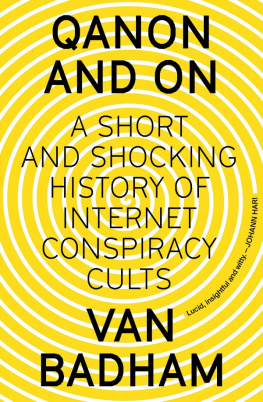To the mother who made me, and to Ben, Sonia, Emma, Sally and Jessamy
especially Jessamy
who make me possible.
however much we might benefit from these devices, and programmable things in general, we also have to be aware that they might not work exactly the way they were intended to work or the way that we expect them to.
Father of the internet Vint Cerf in a speech at Elon University, 9 September 2016

This is a book about two things: the internet and belief.
In the beginning, the belief was that the internet would be a new frontier of democracy, a platform
There were some grounds for optimism. Back in 1974, five years on from the first computertocomputer conversation, the international community of researchers working on
Throughout history, hard data has been the hoarded, precious treasure of powerful aristocrats, secretive guilds or priestly castes, but the developing architecture of the internet democratised information. Now anyone could read or post without having to seek permission, and the new borderless digital wonderlands of what was dubbed cyberspace inspired Belief prevailed in those formative decades, he wrote, that engaging with the internets democratic structure would transform us and our institutions in ways that reflect those values.
This was the spirit with which many welcomed the arrival of social media. The doors of old media gatekeeping were wrenched open. Selfselected hordes of citizen journalists and content creators poured onto the new platforms. Mobile internet technology allowed anyone to seize the means of media production wherever they were, and whenever they liked, with only a phone in their hand.
It all seemed like such a good idea at the time.
There were early auguries that the loudly insisted liberatory potential of the internet may follow a meandering path. Its worth noting that Steven Levys 1995 column appeared amid a thorny political debate about how to safeguard children from an internet that was already heaving with porn. Perhaps the first portent occurred as early as 29 October 1969, the day the very first computernetworked
The Canadian media theorist Marshall McLuhan had predicted the internet years before the Californian computer-lab shenanigans. His 1964 book, Understanding Media: The internets inauspicious UCLA debut, consider McLuhans observations and conclude the medium appears unstable, and the message is a problem.
We are now five decades into humanitys use of the internet. I am of the last Western generation that retains any memory of what life without its daily use was like. Its almost three decades since I opened my first email account, chose my first online alias and joined my first IRC (internet relay chat). In that time, the internet has certainly delivered its promised new frontiers. Unfortunately, a lot of them are just fresh digital territories to experience ancient analogue problems.
Trolling. Dogpiling. Doxxing. Swatting. Swarming. Cyberstalking. Weve created new words to describe the evolving manifestations of old human viciousness that the internets lawlessness has facilitated. As a feminist journalist who maintains an active presence on social media, Im of an internet demographic that has had the historically unprecedented experience of a mass harassment that is not merely public and international but searchable and shareable.
Instead of granting citizens of all nations the experience of speaking without fear, the internet has digitised new sources of individual and collective terror. Its muchvaunted capacity to platform content whenever and wherever has provided raw freedom to bully and harass, slander and defame, threaten, berate, humiliate, stalk, violate and abuse.
Its also meant the proliferation of disinformation and conspiracy theories on a global scale, relentless propaganda campaigns, the promotion of hateful ideologies, the celebration of violence and even active recruitment to terrorist and extremist causes, with lethal results.
Tech writer Nick Carr reminded readers of The Guardian over a decade ago that the prophetic McLuhan warned us about the dangers of the internet before it even existed. McLuhan understood that as media become more interactive, they also become more potent tools for In Understanding Media, McLuhan described the vulnerability of our senses and nervous systems to the private manipulation of those who would try to benefit by taking a lease on our eyes and ears and nerves.
This image of sensory possession has echoed against my skull through the conception, research and writing of this book. Those who surrendered
My interest in the internets extremist underworld resulted from my experience of its attacks. Within only a few months of commencing work at The Guardian in 2013, I found myself on the very public online radar of misogynists, racists, homophobes and outright fascists. I was the subject of attack videos and hateful
I was desperate to understand how and where Id gained a reputation so villainous that it could inspire such treatment. Certainly I was keen to identify those who stirred the harassment and to work out what their possible benefit may be. I began the practice of creating online personae that allowed me to lurk in the communities that drove my abuse so I could preempt their attacks. As I did, I found myself becoming fascinated by the individuals who allowed themselves to be stirred those who, as per the McLuhan quote, wilfully lease out their eyes and ears to conspiratorial thinking. The internet has, at least, realised its potential as a storehouse of global information, so what would motivate a user to so forcefully avoid the facts at their literal fingertips and surrender instead to madeup stories designed to manipulate and control?
Its a question thats remained with me over years now spent lurking and watching as internet manipulation and disinformation campaigns have grown to a geopolitical scale. In 2014, a selfrecruited online army of misogynist video gamers organised a hate campaign that became known as Gamergate. Insisting there was a feminist plot to ruin game entertainment, they targeted gaming identities Anita Sarkeesian, Zo Quinn and others with oceanic levels of factfree harassment. By 2016, an adherent of the online Pizzagate conspiracy theory shot up a Washington restaurant. The shooter had been convinced by internet propaganda that Hillary Clinton was killing and eating children in the restaurant cellar. In 2021, after the pandemic year of coronavirus lockdowns trapped humanity indoors with the dangerous combination of internet connections and fear, adherents of the entirely groundless QAnon conspiracy theory committed acts of terrorism and murder under the influence of their beliefs. On 6 January 2021, many QAnon believers joined the physical mobilisation that marched on the US Capitol Building. They shared chants to hang Vice President Mike Pence, they fought police, they breached the building and some died.
This book charts the history and events of specifically the Gamergate, Pizzagate and QAnon internet conspiracy cults. The aim is to identify how badfaith political actors aligned to a mixture of opportunistic greed and farright causes have weaponised the internet in the service of private manipulations. This book also examines how theyre able to lease the minds of those who follow them. It began as an article I wrote for The Guardian in 2020, responding to pleas for advice from some of my regular readers who had loved ones drifting towards conspiracy thinking and couldnt seem to argue them out of it.
My piece was titled If your friends or family have fallen for an internet conspiracy cult, heres what you should do. It argued my sad discovery that theres no persuading people out of conspiratorial thinking with reason and evidence. Rather, what appears to be an intellectual or psychological problem is actually one of socialisation. What this book posits is that the cure for unreason is not reason. Its to keep contact alive with humans who you dont want to become lost to this.
Next page
